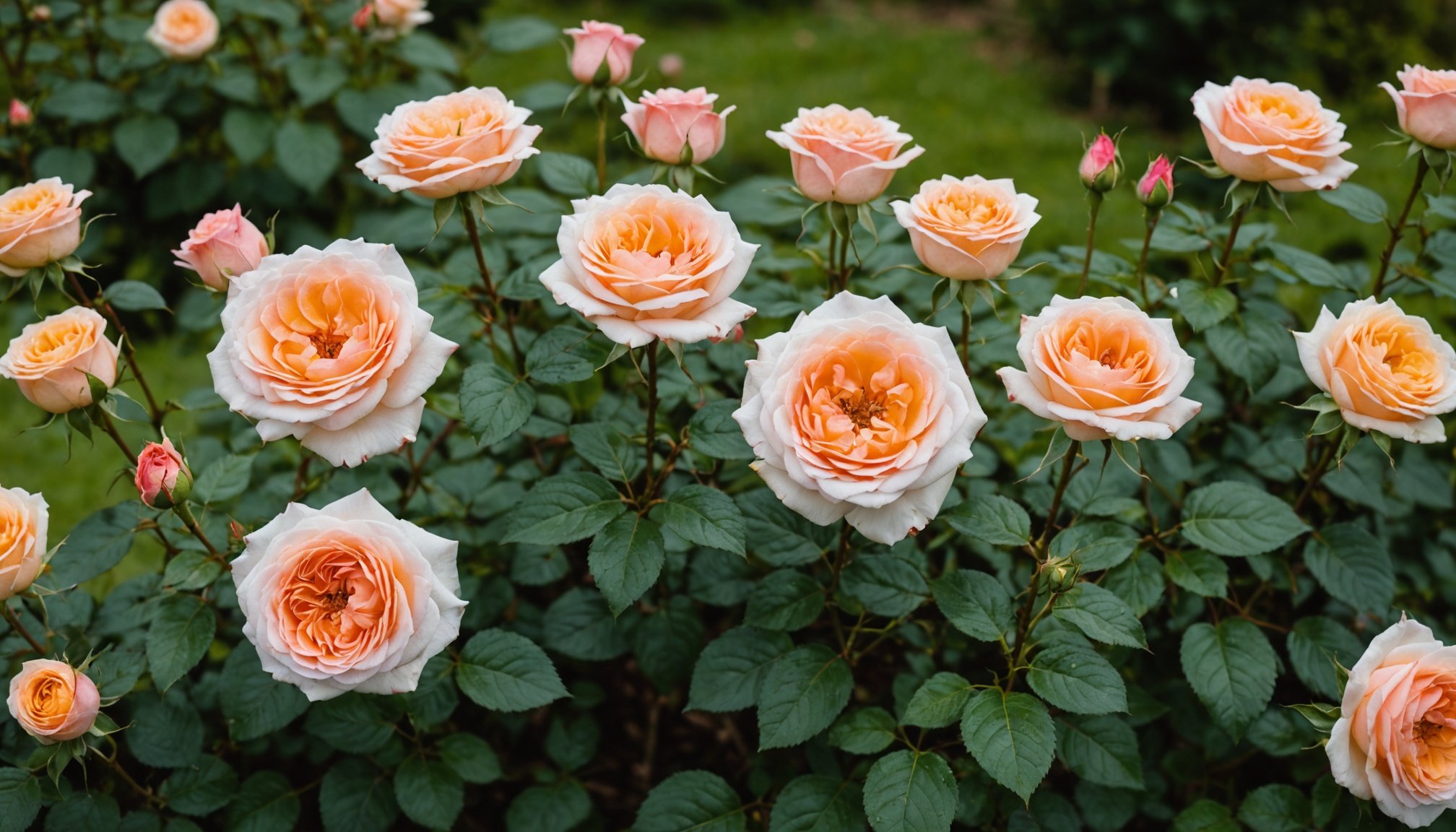Unlocking the Secret: The Perfect Soil pH for Thriving Roses in the UK
When it comes to growing roses, one of the most critical factors to consider is the soil pH. Roses, like many other plants, have specific soil requirements that, when met, can lead to vibrant blooms, healthy growth, and a thriving garden. In this article, we will delve into the world of soil pH, exploring what it means for your roses and how you can create the perfect environment for them to flourish.
Understanding Soil pH
Soil pH is a measure of the soil’s acidity or alkalinity, with a pH of 7 being neutral, below 7 being acidic, and above 7 being alkaline. Roses generally prefer a slightly acidic to neutral soil pH, typically ranging from 6.0 to 6.5.
Dans le meme genre : Natural Strategies for Managing Aphids in Your UK Rose Garden
Why is Soil pH Important for Roses?
Soil pH affects the availability of essential nutrients for your roses. Here’s a detailed look at how different pH levels impact nutrient availability:
- Nutrient Availability: At a slightly acidic pH, nutrients such as phosphorus, potassium, and magnesium are more readily available to the plant. An alkaline soil can lock up these nutrients, making them inaccessible to the rose plant.
- Root Health: A soil pH that is too far from the optimal range can lead to poor root health, making the plant more susceptible to pests and diseases.
- Microbial Activity: Beneficial microbes in the soil, which help in decomposing organic matter and making nutrients available, thrive in slightly acidic to neutral soils.
Determining Your Soil pH
Before you can adjust your soil pH, you need to know what it is currently. Here are some steps to determine your soil pH:
A lire aussi : Transform your garden: discover ourplatform's expertise
Soil Test
A soil test is the most accurate way to determine your soil pH. You can purchase a soil testing kit from a gardening store or send a sample to a laboratory for analysis.
DIY Methods
While not as accurate, there are some DIY methods you can use to get an approximate idea of your soil pH:
- Vinegar and Baking Soda Test: Mix 1 tablespoon of vinegar with 1 tablespoon of soil. If the mixture fizzes, your soil is likely alkaline. If there is no reaction, mix 1 tablespoon of baking soda with 1 tablespoon of soil. If this mixture fizzes, your soil is likely acidic.
- pH Paper: Use pH paper strips, which change color based on the soil pH.
Adjusting Your Soil pH
If your soil test reveals that your soil pH is not within the optimal range for roses, you will need to adjust it.
Lowering Soil pH (Making it More Acidic)
To lower your soil pH, you can add the following:
- Peat Moss or Ericaceous Compost: These are naturally acidic and can help lower the soil pH over time.
- Sulfur: Elemental sulfur or aluminum sulfate can be used, but be cautious as they can lower the pH too much if overused.
Raising Soil pH (Making it More Alkaline)
To raise your soil pH, you can add:
- Lime: Dolomitic lime or calcitic lime can be used to raise the soil pH. However, this is less common for rose gardens since roses prefer slightly acidic soils.
Creating the Perfect Soil for Roses
Beyond adjusting the pH, creating a well-balanced soil structure is crucial for the health and growth of your roses.
Adding Organic Matter
Organic matter such as compost, well-rotted manure, or leaf mold can significantly improve soil health. Here are some benefits:
- Improves Soil Structure: Organic matter helps in creating a well-draining soil that retains moisture but does not become waterlogged.
- Provides Nutrients: As organic matter decomposes, it releases essential nutrients that promote plant growth.
- Supports Microbial Activity: Organic matter is a food source for beneficial microbes, which are vital for plant health.
Using the Right Compost
When choosing a compost, look for one that is specifically formulated for roses or general garden use. Here are some tips:
- Ericaceous Compost: If you have acid-loving plants like hybrid tea roses, an ericaceous compost can be beneficial.
- Balanced Compost: A balanced compost that is neither too acidic nor too alkaline is ideal for most rose varieties.
Practical Tips for Rose Gardeners
Here are some practical tips to ensure your roses thrive in the UK climate:
Early Spring Preparation
- Soil Test: Conduct a soil test in early spring to determine if any adjustments are needed.
- Add Compost: Mix in a layer of compost or well-rotted manure to improve soil structure and provide nutrients.
- Prune Roses: Prune your roses in late winter or early spring to promote new growth.
Watering and Mulching
- Water Deeply: Roses need about 1 inch of water per week. Water deeply but avoid frequent shallow watering.
- Mulch Around Plants: Mulching helps retain moisture, suppress weeds, and regulate soil temperature.
Monitoring Plant Health
- Check Leaves: Regularly inspect the leaves for signs of nutrient deficiencies or pests and diseases.
- Adjust as Needed: Based on your observations, adjust your soil care routine. For example, if you notice yellowing leaves, it might indicate a lack of iron, which is more available in slightly acidic soils.
Common Mistakes to Avoid
Here are some common mistakes rose gardeners make and how to avoid them:
Overwatering
- Check Drainage: Ensure your soil has good drainage to prevent waterlogging.
- Avoid Frequent Watering: Water your roses deeply but less frequently to encourage deep root growth.
Ignoring Soil Structure
- Add Organic Matter: Regularly add compost or other organic matter to maintain a healthy soil structure.
- Avoid Compaction: Avoid walking on the soil around your roses to prevent compaction, which can hinder root growth.
Creating the perfect soil for your roses is a multifaceted process that involves understanding and adjusting the soil pH, adding the right organic matter, and maintaining good gardening practices. Here is a summary of the key points:
Key Takeaways
- Optimal pH Range: Roses prefer a slightly acidic to neutral soil pH (6.0-6.5).
- Soil Test: Regularly test your soil to determine its pH and nutrient levels.
- Add Organic Matter: Use compost or well-rotted manure to improve soil structure and provide essential nutrients.
- Water Wisely: Water deeply but avoid frequent shallow watering.
- Monitor Plant Health: Regularly inspect your roses for signs of nutrient deficiencies or pests and diseases.
By following these guidelines, you can unlock the secret to growing thriving, healthy roses in your UK garden.
Detailed Bullet Point List: Tips for Maintaining Optimal Soil pH for Roses
- Conduct Regular Soil Tests: Test your soil at least once a year to ensure it remains within the optimal pH range.
- Use the Right Compost: Choose a compost that is balanced or slightly acidic, depending on your rose variety.
- Avoid Overfertilizing: Too much fertilizer can alter the soil pH and cause nutrient imbalances.
- Maintain Good Drainage: Ensure your soil has good drainage to prevent waterlogging and root rot.
- Mulch Around Plants: Mulching helps retain moisture, suppress weeds, and regulate soil temperature.
- Monitor for Pests and Diseases: Regularly inspect your roses for signs of pests or diseases, which can be exacerbated by poor soil health.
- Add Lime or Sulfur Cautiously: When adjusting your soil pH, use lime or sulfur sparingly to avoid extreme changes.
- Incorporate Organic Matter in Early Spring: Mix in compost or well-rotted manure in early spring to prepare the soil for the growing season.
Comprehensive Table: Nutrient Availability at Different Soil pH Levels
| Soil pH | Nutrient Availability |
|---|---|
| 5.5-6.0 | High availability of phosphorus, potassium, magnesium, and micronutrients |
| 6.0-6.5 | Optimal availability of most essential nutrients for roses |
| 6.5-7.0 | Neutral pH; most nutrients available but may start to decline |
| 7.0-7.5 | Phosphorus and micronutrients start to become less available |
| 7.5-8.0 | Many essential nutrients become locked up and unavailable to the plant |
| 8.0+ | Most nutrients are unavailable; soil is too alkaline for roses |
Quotes from Rose Experts
- “The key to growing healthy roses is not just about the plant itself, but about creating a healthy soil environment. A slightly acidic to neutral soil pH is crucial for optimal nutrient availability.” – David Austin, renowned rose breeder.
- “Regular soil testing and adjusting the pH accordingly can make a significant difference in the health and growth of your roses. It’s a small step that can lead to big rewards.” – Royal Horticultural Society.
By following these guidelines and tips, you can ensure your roses thrive in a well-balanced and nutrient-rich soil environment, making your garden a true haven for these beautiful flowers.












